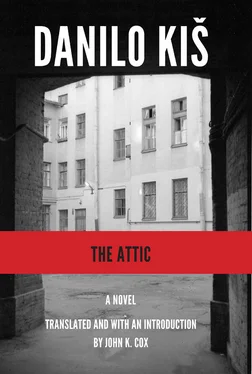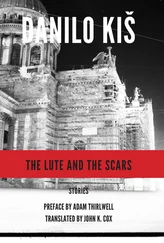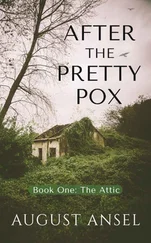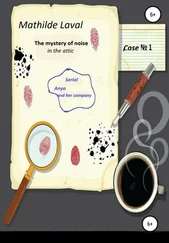Danilo Kiš - The Attic
Здесь есть возможность читать онлайн «Danilo Kiš - The Attic» весь текст электронной книги совершенно бесплатно (целиком полную версию без сокращений). В некоторых случаях можно слушать аудио, скачать через торрент в формате fb2 и присутствует краткое содержание. Год выпуска: 2012, Издательство: Dalkey Archive Press, Жанр: Современная проза, на английском языке. Описание произведения, (предисловие) а так же отзывы посетителей доступны на портале библиотеки ЛибКат.
- Название:The Attic
- Автор:
- Издательство:Dalkey Archive Press
- Жанр:
- Год:2012
- ISBN:нет данных
- Рейтинг книги:4 / 5. Голосов: 1
-
Избранное:Добавить в избранное
- Отзывы:
-
Ваша оценка:
- 80
- 1
- 2
- 3
- 4
- 5
The Attic: краткое содержание, описание и аннотация
Предлагаем к чтению аннотацию, описание, краткое содержание или предисловие (зависит от того, что написал сам автор книги «The Attic»). Если вы не нашли необходимую информацию о книге — напишите в комментариях, мы постараемся отыскать её.
Bildungsroman
The Attic — читать онлайн бесплатно полную книгу (весь текст) целиком
Ниже представлен текст книги, разбитый по страницам. Система сохранения места последней прочитанной страницы, позволяет с удобством читать онлайн бесплатно книгу «The Attic», без необходимости каждый раз заново искать на чём Вы остановились. Поставьте закладку, и сможете в любой момент перейти на страницу, на которой закончили чтение.
Интервал:
Закладка:
Always in search of new “takes” on reality, Orpheus and Billy open a pub and continue their meandering ways. Their decadence is really just sloppy self-discovery. Their indulgence becomes tempered by encounters with their emotional and physical limitations and their artistic needs. A great mystery or puzzle of life, perhaps the Ultimate Dilemma for the idealistic and the naive, is posed at the end of Chapter Seven and then again in the following chapter. Should one compromise with life? Or is it better to kill oneself than give in to “reality”? It is the same rigor and passion in Orpheus that makes it hard for him to decide between these two options that also makes it necessary for him to compromise with life. The reason for this is that his art will never find space to develop if he remains rigid and self-centered; his appetites will consume him if he adheres to a false consistency.
Then, in another bar with another friend, we find out that Orpheus is writing this story (in the form of a novel with the same title as the book we are reading) as he’s living it. Our unusual and rather casual hero finally takes note of the mottled variety of life around him — especially the misery of some of his neighbors in the apartment building. Images of girlish innocence and fragility at the end of the book hearken back to the early chapters, and Orpheus is ready for his new mission: he decides to “dismount from this star” and start to meet the world as it really is. He knows he can expect a rough ride, as the closing scene conveys to him. The same thing applies to Kiš himself, for whom the writing of this book can be seen as a kind of exercise in the development of an artistic credo. It is a blend of autobiography and mission statement.
One of the best summations of Kiš’s style of writing is made by the American scholar Ilan Stavans, who notes that Kiš was “hyperdescriptive” in the manner of Bruno Schulz and “concise and astonishingly erudite” in the manner of Jorge Luis Borges. 1
The Attic itself is the work of a young author. This is obvious not just because of its date of publication but because it is, to quote the Austrian critic Karl-Markus Gauß, “a brash and tumultuous work” in which the author “demonstrates his jaunty reverence for the bohemian world” and “his rigorous ethic of detail.” 2This latter characteristic would prove enormously important in Kiš’s later work, as would the nascent elements of postmodernism in The Attic . 3The Serbian critic Petar Pijanović has studied extensively the “quest for form” in the novel — that is, the meta-narration involving the blended character of Orpheus, who is both narrator and author. 4Form is obviously something that Kiš was studying for himself through the writing of this work.
Reviewers and critics writing for English-speaking readers have barely commented on The Attic , since it has not been available in English until recently. But, in the eyes of this translator, the novel reads as a powerful statement of Kiš’s nascent artistic credo at a crucial time in his artistic development. That is to say, it is difficult to ignore The Attic ’s apparent reflection of many contemporaneous developments in the author’s own life: the biographical elements of a bohemian Bildungsroman are quite prominent. A young storyteller at the time, a Balkan bard like his protagonist, Kiš too was finding his voice and formulating his credo, which is ultimately rooted in a strong sense of connectedness to other people. Some of Kiš’s hallmark stylistic traits — such as the lists of realia , the learned (if miniature) digressions, the ironic humor — are already present in The Attic , although the crushing weight of history that envelops his later prose is absent. Rich in references to music, painting, philosophy, and gastronomy, as well as literature, The Attic is a laboratory of technique and the anvil of an artistic ethos — and, of course, a more than self-assured first novel in its own right. As a work of art, The Attic is at once a depiction of life in bohemian Belgrade, a register of stylistic devices and themes that would recur throughout Kiš’s oeuvre, and an account of one young man’s quest to work out his approach to representation by balancing art, life, and text. Whether or not we read it as a “portrait of the artist as a young man,” The Attic adds up to an admirable first novel, indeed.
This translation is dedicated to the best set of language teachers a young American could have had: Frau Fritsche, Marilyn Jenkins Turbeville, Kim Vivian, Roger Weinstein, Magda Gerő, Sibelan Forrester, Anto Knežević, Piotr Drozdowski, Anka Blatnik, and Jana Kobav. Thank you!
And thanks are due too to Milo Yelesiyevich, my first editor on this volume, whose input and aid were invaluable to the project.
JOHN K. COX, 2012
1. Ilan Stavans, “Introduction to ‘Dogs and Books’ by Danilo Kiš,” The Oxford Book of Jewish Stories (New York: Oxford University Press, 1990): 325.
2. Karl-Markus Gauß, “Auf dem Grunde des Pannonischen Meeres: Danilo Kiš,” Die Vernichtung Mitteleuropas: Essays (Klagenfurt: Wieser, 1991): 128–129:
3. Jovan Delić, Kroz prozu Danila Kiša (Beograd: BIGZ, 1997): 38.
4. Petar Pijanović, Proza Danila Kiša (Priština: Jedinstvo, 1992): 69.
THE ATTIC: A SATIRICAL POEM
We will not catch sight of any romantic cell, cabin, or thatched-roof hut; before us will rise a multi-story stone edifice; the higher the floor, the colder it is to live there. Poverty, sorrows, misfortunes, ignorance, and illness drive a person higher, up one floor after another. While a person is down below, he or she is still interested in the colorful jumble of life and participates in it in some fashion, even though it has generally been incomprehensible and inaccessible to him since birth. (With the rise of civilization the number of people “maladjusted to life” grows — one should not lose sight of that fact.) The more that life pushes a person up to greater and greater heights, the colder it gets for him or her, and the less one is capable of comprehending life and adjusting to it.
— A.A. BLOKEURYDICE
I listened to invisible trains weeping in the night and to crackly leaves latching onto the hard, frozen earth with their fingernails.
Everywhere packs of ravenous, scraggly dogs came out to meet us. They appeared out of dark doorways and squeezed through narrow openings in the fences. They would accompany us mutely in large packs. But from time to time they would raise their somber, sad eyes to look at us. They had some sort of strange respect for our noiseless steps, for our embraces.
Some heavy blue autumn plums dropped onto the path from a shadowy tree whose branches jutted over a fence. I had never believed that such firm blue plums could exist in autumn. But back then we were so preoccupied with our embraces that we didn’t pay any attention to things like that. And then one night, in a startling flash from the headlights of an old-fashioned car, we noticed that a band of dogs, which had so far followed us silently, was gathering plums, almost reverentially, from the gravelly road and the muddy ditch. All at once it became clear to me why the dogs were so silent and dejected: these wild autumn plums had contracted their vocal cords, as alum would. I heard only the pits, with which they were allaying their hunger, cracking between their teeth. It looked, however, as if they themselves were ashamed of all this; as soon as the car cast the unexpected illumination of its headlights, they hid in the ditch next to the road, though the ones who hadn’t had time to get out of the way remained stock still, as if petrified.
Читать дальшеИнтервал:
Закладка:
Похожие книги на «The Attic»
Представляем Вашему вниманию похожие книги на «The Attic» списком для выбора. Мы отобрали схожую по названию и смыслу литературу в надежде предоставить читателям больше вариантов отыскать новые, интересные, ещё непрочитанные произведения.
Обсуждение, отзывы о книге «The Attic» и просто собственные мнения читателей. Оставьте ваши комментарии, напишите, что Вы думаете о произведении, его смысле или главных героях. Укажите что конкретно понравилось, а что нет, и почему Вы так считаете.












